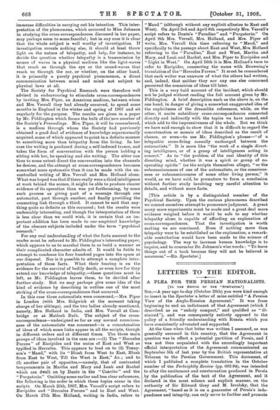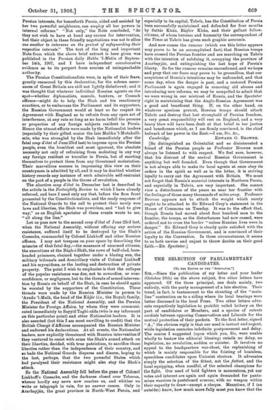LETTERS TO THE EDITOR.
A PLEA FOR THE PERSIAN NATIONALISTS. [TO TUB EDITOR OP Tilt 'SPECTATOR:1 SIE,-A year ago to-day (October 26th) you were kind enough to insert in the Spectator a letter of mine entitled "A Persian View of the Anglo-Russian Agreement." It was from beginning to end an indictment of that Agreement (which I described as an "unholy compact," and qualified as "ill- starred"), and was consequently entirely opposed to the policy of a friendly understanding with Russia which you have consistently advocated and supported.
At the time when that letter was written I assumed, as was generally assumed in this country, that the Agreement in question was in effect a potential partition of Persia, and I was not then acquainted with the exceedingly important official interpretation of the Agreement communicated on September 5th of last year by the British representative at Teheran to the Persian Government. This document, of which I published a complete translation in the October number of the -Fortnightly Review (pp. 692-94), was intended to allay the excitement and consternation produced in Persia by the publication of the text of the Agreement, and it declared in the moat solemn and explicit manner, on the authority of Sir Edward Grey and M. Isvolsky, that the Agreement, "based as it is on a guarantee of Persia's inde- pendence and integrity, can only serve to further and promote Persian interests, for henceforth Persia, aided and assisted by her two powerful neighbours, can employ all her powers in internal reforms." "Not only," the Note concluded, "do they not wish to have at hand any excuse for intervention, but their object in these friendly negotiations was not to allow one another to intervene on the pre:ext of safeguarding their respective interests." The text of the long and important Note from which the above brief extract is here given was published in the Persian daily Hablu 7-11fatin of Septem- ber 14th, 1907, and I have independent corroborative evidence as to its purport from sources of unimpeachable authority.
The Persian Constitutionalists were,. in spite of their fears, greatly reassured by this declaration, for the solemn assur- ances of Great Britain are still not lightly disbelieved; and it was thought that whatever individual Russian agents on the spot—whether diplomatists, consuls, bankers, or Cossack officers—might do to help the Shah and his reactionary courtiers, or to embarrass the Parliament and its supporters, the Russian Government would at least so far respect its Agreement with England as to refrain from any open act of interference, at any rate so long as no harm befell the persons or properties of any foreign subjects resident in Persia. Hence the utmost efforts were made by the Nationalist leaders (especially by their gifted orator the late Malikul-Mutakalli- min, who was strangled by the Shah immediately after the fatal coup d'etat of June 23rd last) to impress upon the Persian people, even the humblest and most ignorant, the absolute necessity not only of refraining from molesting in any way any foreign resident or traveller in Persia, but of exerting themselves to protect them from any threatened molestation. Their marvellous success in impressing this view on their countrymen is admitted by all, and it may be doubted whether history records any instance of such admirable self-restraint on the part of a people in the throes of revolution.
The abortive coup d'etat in December last is described in the article in the _Fortnightly Review to which I have already referred, and here I need only say that, before the firm front presented by the Constitutionalists, and the ready response of the National Guards to the call to protect their newly won Jaws and liberties, the Shah was powerless, and "had to give way," as an English spectator of these events wrote to me, "all along the line."
Let us pass now to the second coup d'etat of June 23rd last, when the National Assembly, without offering any serious resistance, suffered itself to be destroyed by the Shah's Cossacks, commanded by Colonel Liakhoff and other Russian officers. I may not trespass on your space by describing the miseries of that fatal day,—the massacre of unarmed citizens, the executions at the Bagh-i-Shah, the rows of half-clad, bare- headed prisoners, chained together under a blazing sun, the military tribunals and domiciliary visits of Colonel Liakhoff and his myrmidons, or the looting and destruction of private property. The point I wish to emphasise is that the collapse of the popular resistance was due, not to cowardice, or over- confidence, or negligence, but to the threats of armed interven- tion by Russia on behalf of the Shah, in calls be should again be worsted by the supporters of the Conatitution. These threats were made by the Russian Minister in person to `Azudu 'l-Mulk, the head of the Hajar (i.e., the Royal) family, the President of the National Assembly, and the Persian Minister for Foreign Affairs, by whom they were communi- cated immediately to Sayyid Taghi.záda (who is my informant on this particular point) and other Nationalist leaders. It is also asserted (but this I am most unwilling to credit) that the British Charge d'Affaires accompanied the Russian Minister and endorsed his declarations. At all events, the Nationalist leaders, now explicitly threatened with Russian intervention if they ventured to resist with arms the Shah's armed attack on their liberties, decided, with true patriotism, to sacrifice those liberties rather than the independence of their country, and so bade the National Guards disperse and disarm, hoping to the last, perhaps, that the two powerful States which bad paralysed their resistance might also stay the Shah's attack.
So the National Assembly fell before the guns of Colonel Liakhoff's Cossacks, and the darkness closed over Teheran, whence hardly any news now reaches us, and whither we
• write or telegraph in vain, for no answer comes. Only in Azarbayjan, the great province in North-West Persia, and
especially in its capital, Tabriz, has the Constitution of Persia been successfully maintained and defended for four months by Sattar Khan, Baghir Khan, and their gallant fellow- citizens, of whose heroism and humanity the correspondent of the Times at Tabriz has given such graphic accounts.
And now cornea the rumour (which ere this letter appears may prove to be an accomplished fact) that Russian troops have crossed the Persian frontier and are marching on Tabriz with the intention of subduing it, occupying the province of Azarbayjan, and extinguishing the last hope of Persia's liberty. So far the rumour remains unconfirmed, and we hope and pray that our fears may prove to be groundless, that our suspicions of Russia's intentions may be unfounded, and that some day, when the danger is past, and a restored Persian Parliament is again engaged in removing old abuses and introducing new reforms, we may be compelled to admit that we were wrong in our mistrust of Russia, and the Spectator right in maintaining that the Anglo-Russian Agreement was a good and beneficent thing. If, on the other hand, on whatever specious pretext, Russian troops should attack Tabriz and destroy that last stronghold of Persian freedom, a very great responsibility will rest on England, and a very heavy blow will have been dealt at that belief in her justice and beneficence which, as I am firmly convinced, is the chief bulwark of her power in the East.—I am, Sir, 8tc., [So distinguished an Orientalist and so disinterested a friend of the Persian people as Professor Browne must always be listened to with respect. We feel sure, however, that his distrust of the central Russian Government is anything but well founded. Even though that Government is not always able to make its local agents at once obey its orders in the spirit as well as in the letter, it is striving loyally to carry out the Agreement with Britain. We must not forget that Russia's material interests in Northern Persia, and especially in Tabriz, are very important. She cannot view a disturbance of the peace so near her frontier with the feelings of those many thousands of miles away. Professor BrOWDO appears not to attach the weight which surely ought to be attached to Sir Edward Grey's statement in the House of Commons on Tuesday. It was to the effect that, though Russia had moved about four hundred men to the frontier, the troops, as the disturbances had now ceased, were ordered not to cross the border "unless Russian lives were in danger." Sir Edward Grey is clearly quite satisfied with the action of the Russian Government, and is convinced of their loyalty to the Convention. In these circumstances, it seems to us both unwise and unjust to throw doubts on their good faith.—En. Spectator.]















































 Previous page
Previous page